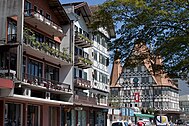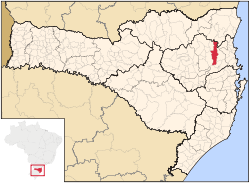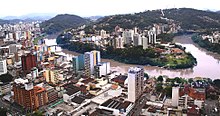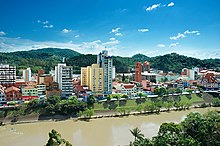| This article needs additional citations for verification. Please help improve this article by adding citations to reliable sources. Unsourced material may be challenged and removed. Find sources: "Blumenau" – news · newspapers · books · scholar · JSTOR (June 2014) (Learn how and when to remove this message) |
| Blumenau | |
|---|---|
| Municipality | |
| Municipality of Blumenau | |
       | |
 Flag Flag Seal Seal | |
| Nickname(s): Cidade Jardim ("Garden City") and Alemanha Tropical ("Tropical Germany") | |
| Motto: Pro Sancta Catharina et Brasilia (Latin) | |
 Location in Santa Catarina Location in Santa Catarina | |
 | |
| Coordinates: 26°55′08″S 49°03′57″W / 26.91889°S 49.06583°W / -26.91889; -49.06583 | |
| Country | |
| Region | South |
| State | |
| Founded | September 2, 1850 |
| Named for | Hermann Blumenau |
| Government | |
| • Mayor | Mário Hildebrandt (2021 - 2024) (PODE) |
| Area | |
| • Total | 519.837 km (200.710 sq mi) |
| Elevation | 21 m (69 ft) |
| Population | |
| • Total | 361,855 |
| • Density | 700/km (1,800/sq mi) |
| Time zone | GMT-3 |
| Postal code | 89000-000 |
| Area code | +55 47 |
| HDI (2010) | 0.806 – very high |
| Website | blumenau |




Blumenau (Brazilian Portuguese: [blumeˈnaw]) is a city in Vale do Itajaí, Santa Catarina state, in the South Region of Brazil, 130 km (81 mi) from the state capital Florianópolis.
The city was founded by the German chemist and pharmacist Hermann Blumenau (1819–1899), who arrived on a boat via the Itajaí-Açu River accompanied by seventeen other Germans, and still celebrates its German heritage, including the second largest Oktoberfest in the world.
History
The city was founded September 2, 1850, by Hermann Bruno Otto Blumenau and seventeen other German immigrants. Later arrivals include biologist and early proponent of Darwinian Evolution, Fritz Müller.
The history of Blumenau is the result of the arrival of German immigrants who settled these fertile areas of the Atlantic Forest. Having an interest in the problems faced by European immigrants, in 1845 Hermann Blumenau reached an agreement with the Society for the Protection of German Emigrants to represent it and traveled to Brazil, aiming to create new German settlements and to check the situation of those that already existed. He traveled to Rio Grande do Sul, and then to Santa Catarina, where he visited the German colony of São Pedro de Alcântara. Aware of comments about the Itajaí Valley, he explored it in detail, in association with his compatriot Ferdinand Hackradt, since the aforementioned society was dissolved.
After taking certain precautions, Hermann Blumenau headed for Germany, to seek immigrants. On September 2, 1850, Hermann Blumenau returned to the chosen area with the seventeen initial immigrants. Despite the floods, clashes with wild animals and even with the indigenous peoples, due to the work of German immigrants willing to migrate continuously in greater numbers, the settlement prospered. Those first immigrants had a great support from the Brazilian government, who gave them land, housing, livestock, seeds, education and healthcare for a very low price and in many cases, entirely free.
On February 4, 1880, the municipality of Blumenau was created, composed of about 13,000 residents.
Demographics
| Year | Pop. | ±% |
|---|---|---|
| 1970 | 100,275 | — |
| 1980 | 157,251 | +56.8% |
| 1991 | 212,025 | +34.8% |
| 2000 | 261,808 | +23.5% |
| 2010 | 309,011 | +18.0% |
| 2022 | 361,261 | +16.9% |
| Source: | ||
As of 2020, Blumenau had an estimated population of 361,855 people, with an area of 519 km (200 sq mi). The main ethnic origin of the city inhabitants are German and Italian. The city displays many historical and cultural reminders of their heritage, such as houses and other buildings built in traditional German styles, statues, and memorials.
Blumenau, compared to other Brazilian cities, has a very high Human Development Index, 0.806 as of 2010.
Ethnic composition
- Source: 2022 census
| Race/Skin color | Percentage | Number |
| White | 79.0% | 285,354 |
| Pardo (Mixed-race) | 17.1% | 61,684 |
| Black | 3.7% | 13,272 |
| Asian | 0.2% | 580 |
| Indigenous | 0.1% | 367 |
Religion
- Source: 2010 IBGE Census
| Religion | Percentage | Number |
| Catholics | 73.90% | 193,474 |
| Protestants | 22.13% | 57,935 |
| No religion | 1.22% | 3,200 |
| Kardecists | 0.72% | 1,894 |
Geography
The city is located in a valley bisected by the Itajaí-Açu River, surrounded by hills with forests. The lower areas, including towers and tall buildings in the city center, constantly suffer from the threat of floods. Blumenau's first recorded flood took place in the dawn on September 23, 1880. The worst took place in 1983 and 1984, when the city was completely isolated for weeks. Today, Blumenau is well-prepared against such threats, but many citizens prefer to live in higher areas spread into the nearby hills and plains to avoid flooding. However, this planning could not avoid even worse flooding in late November 2008, that killed over 100 and forced thousands to evacuate.
Climate
The climate of Blumenau is considered to be subtropical, a climate of transition between the predominantly tropical climate of Brazil and the predominantly temperate climate of Argentina. Under the Köppen climate classification, the city has a warm, humid subtropical climate.
Blumenau, like the entire state of Santa Catarina, is located south of the Tropic of Capricorn; therefore it is mild in the winter with temperatures averaging 16.6 °C (61 °F) and hot and humid in the summer with high temperatures averaging around 30 °C (87 °F). On July 23, 2013 the downtown of the city got a snow-rain mix and higher neighborhoods had accumulating snow.
| Climate data for Blumenau (1976–2005) | |||||||||||||
|---|---|---|---|---|---|---|---|---|---|---|---|---|---|
| Month | Jan | Feb | Mar | Apr | May | Jun | Jul | Aug | Sep | Oct | Nov | Dec | Year |
| Mean daily maximum °C (°F) | 31.9 (89.4) |
31.6 (88.9) |
30.5 (86.9) |
27.9 (82.2) |
24.9 (76.8) |
22.5 (72.5) |
22.3 (72.1) |
23.3 (73.9) |
24.0 (75.2) |
26.1 (79.0) |
28.5 (83.3) |
30.7 (87.3) |
27.0 (80.6) |
| Daily mean °C (°F) | 24.5 (76.1) |
24.4 (75.9) |
23.2 (73.8) |
21.0 (69.8) |
18.1 (64.6) |
16.2 (61.2) |
15.5 (59.9) |
16.4 (61.5) |
17.9 (64.2) |
19.6 (67.3) |
21.5 (70.7) |
23.4 (74.1) |
20.1 (68.3) |
| Mean daily minimum °C (°F) | 20.2 (68.4) |
20.3 (68.5) |
19.5 (67.1) |
17.1 (62.8) |
14.1 (57.4) |
12.4 (54.3) |
11.6 (52.9) |
12.4 (54.3) |
14.2 (57.6) |
15.9 (60.6) |
17.3 (63.1) |
18.9 (66.0) |
16.2 (61.1) |
| Average precipitation mm (inches) | 250.0 (9.84) |
222.0 (8.74) |
162.0 (6.38) |
101.0 (3.98) |
115.0 (4.53) |
111.0 (4.37) |
99.0 (3.90) |
100.0 (3.94) |
167.0 (6.57) |
163.0 (6.42) |
157.0 (6.18) |
176.0 (6.93) |
1,823 (71.78) |
| Average relative humidity (%) | 82 | 84 | 84 | 85 | 86 | 87 | 86 | 85 | 85 | 84 | 81 | 81 | 84 |
| Mean monthly sunshine hours | 165 | 153 | 165 | 148 | 144 | 123 | 136 | 133 | 93 | 117 | 141 | 161 | 1,679 |
| Source 1: Empresa Brasileira de Pesquisa Agropecuária (EMBRAPA) | |||||||||||||
| Source 2: Climatempo (precipitation) | |||||||||||||
Economy
Blumenau's main economic activity is still the textile industry, represented by large manufacturers such as Cia. Hering, Karsten and Teka.
Another area that draws attention is that of information technology; the city is the headquarters of the so-called Brazilian Silicon Valley, and many software leaders in its segment, some of whom were born in Blusoft and Instituto Gene startup incubators. Blumenau is also known as a location for the manufacturing of metallurgic, mechanical, and electrical equipment.
It has a strong economy, boosted by strong trade, service, and tourism events, with exhibitions of international importance, which are generally held in Vila Germânica (German Villa Park). Additionally, a new but rapidly expanding market is the production of craft beer, such as Eisenbahn.
Transport
Even though Blumenau is served by Quero-quero Airport, normally passengers use scheduled flights operated from Ministro Victor Konder International Airport, located in the nearby municipality of Navegantes. Gol Airlines, Azul Brazilian Airlines, and Latam offer for its passengers bus transfers between Navegantes and Blumenau at regular times. During Oktoberfest, Azul operates flights at the local airport.
Tourism
The Blumenau's Tourism Department maintains four tour routes covering different aspects of the city. Besides these, there's the festival of the municipality. Also, the Oktoberfest of Blumenau, held every October, attracts over a million tourists every year. Originally begun as a fundraiser to alleviate the devastating floods of 1983 and 1984, the Blumenau Oktoberfest has become the second largest Oktoberfest after Munich.
Subdivisions
Blumenau has 35 neighbourhoods:
- Água Verde
- Badenfurt
- Boa Vista
- Bom Retiro
- Centro
- Escola Agrícola
- Fidélis
- Fortaleza
- Fortaleza Alta
- Garcia
- Glória
- Itoupava Central
- Itoupava Norte
- Itoupava Seca
- Itoupavazinha
- Jardim Blumenau
- Nova Esperança
- Passo Manso
- Ponta Aguda
- Progresso
- Ribeirão Fresco
- Salto
- Salto do Norte
- Salto Weissbach
- Testo Salto
- Tribess
- Valparaíso
- Velha
- Velha Central
- Velha Grande
- Victor Konder
- Vila Formosa
- Vila Itoupava
- Vila Nova
- Vorstadt
Notable people


- Hermann Blumenau (1819–1899) German pharmacist who founded the city of Blumenau
- Emílio Henrique Baumgart (1889 in Blumenau - 1943) architect and engineer
- Fritz Müller (1821 – 1897 in Blumenau) biologist, an early advocate of Darwinism
- Vera Fischer (born 1951 in Blumenau) actress
- Rita Schadrack (1931 in Blumenau – 1988) film, stage, and voice actress
- Martin Drewes (1918 – 2013 in Blumenau) Luftwaffe military aviator, night fighter ace in WWII
- Mariana Weickert (born 1972 in Blumenau) model
- João Geraldo Kuhlmann (1882 in Blumenau - 1958) a botanist, specialist on the taxonomy of Angiosperms
- Luiz Henrique da Silveira (1940 in Blumenau – 2015) politician and lawyer
- Edward af Sillén (born 1982 in Blumenau) Swedish screenwriter & director for film and TV
- Armin Zimmermann (1917 in Blumenau – 1976) German admiral and Inspector General of the Bundeswehr
Sport

- Tiago Splitter, (born 1985 in Blumenau) former professional basketball player
- Tiago Volpi, (born 1990 in Blumenau) football goalkeeper
- Bruna Pickler, (born 1990 in Blumenau), athlete, actress, composer and sports reporter
- Ana Amorim Taleska, (born 1983 in Blumenau) handball player
- Christian Maicon Hening, (born 1978 in Blumenau) football player
- Eduarda Amorim Taleska, (born 1986 in Blumenau) handball player
- Rafael Schmitz, (born 1980 in Blumenau) football player
- Barbara Bruch, (born 1987 in Blumenau) female volleyball player
- Jean Carlo Witte, (born 1977 in Blumenau) football player
- Nathan Allan de Souza, (born 1996 in Blumenau) football player
- Teco Padaratz, (born 1971 in Blumenau) former surfer, two-times champion of the WQS.
Twin towns – sister cities
See also: List of twin towns and sister cities in BrazilBlumenau is twinned with:
 Bariloche, Argentina
Bariloche, Argentina Campinas, Brazil
Campinas, Brazil Osorno, Chile
Osorno, Chile Petrópolis, Brazil
Petrópolis, Brazil Weingarten, Germany
Weingarten, Germany Posadas, Argentina
Posadas, Argentina Badajoz, Spain
Badajoz, Spain Oxapampa, Peru
Oxapampa, Peru
See also
References
- IBGE 2020
- "Ranking" (PDF). United Nations Development Programme (UNDP). Archived from the original (PDF) on July 8, 2014. Retrieved August 1, 2013.
- ^ el-Khatib 1970, pp. 19–20
- "2022 Census Overview" (in Portuguese).
- Archived April 20, 2012, at the Wayback Machine
- "Ranking decrescente do IDH-M dos municípios do Brasil". Atlas do Desenvolvimento Humano. Programa das Nações Unidas para o Desenvolvimento (PNUD). 2000. Archived from the original on 3 October 2009. Retrieved 11 October 2008.
- "Censo 2022 - Panorama".
- "Sistema IBGE de Recuperação Automática - SIDRA". ibge.gov.br.
- "Neve é registrada em cinco pontos de Blumenau". Jornal de Santa Catarina.
- "Atlas climático da Região Sul do Brasil: Estados do Paraná, Santa Catarina e Rio Grande do Sul" (PDF). EMBRAPA. Archived from the original (PDF) on 14 January 2024. Retrieved 25 May 2024.
- "Climatologia em Blumenau, BR". Climatempo. Retrieved 25 May 2024.
- "Local Transportation-Navegantes". Gol Airlines. Archived from the original on 25 January 2011. Retrieved 27 March 2011.
- "Ônibus Executivo/Blumenau-Aeroporto de Navegantes" (in Portuguese). Azul Brazilian Airlines. Archived from the original on 22 March 2011. Retrieved 27 March 2011.
- "ORF-Radiothek". oe1.orf.at. Retrieved 2024-09-24.
- "Relações internacionais: Cidades irmãs". santur.sc.gov.br (in Portuguese). Agência de Desenvolvimento do Turismo de Santa Catarina – SANTUR. Retrieved 2020-11-18.
Sources
- el-Khatib, Said Mohamad (1970). História de Santa Catarina (in Brazilian Portuguese). Grafipar.
External links
 Blumenau travel guide from Wikivoyage
Blumenau travel guide from Wikivoyage
| Vale do Itajaí mesoregion of Santa Catarina | |
|---|---|
| |
| Blumenau | |
| Itajaí | |
| Ituporanga | |
| Rio do Sul | |
26°56′S 49°03′W / 26.933°S 49.050°W / -26.933; -49.050
Categories: